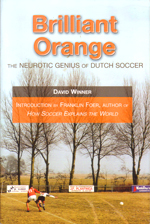 It must be a year ago that I stayed overnight with my brother in Melbourne, and he told me about this book. He made it sound fascinating, and I said I’d make sure to look it up. Naturally, I forgot all about it.
It must be a year ago that I stayed overnight with my brother in Melbourne, and he told me about this book. He made it sound fascinating, and I said I’d make sure to look it up. Naturally, I forgot all about it.
Until a month ago, when @vanderwal mentioned it in a tweet. I follow Thomas Vander Wal on Twitter because he knows more about how information of all kinds is exchanged between people using internet technologies than just about anyone I know. That he’s from a Dutch background is a bonus.
The name of the book rang a bell, I looked it up and ordered a copy from Amazon the same day, 10 days into the World Cup.
It arrived just after the Netherlands beat Slovakia 2-1 to set up a quarter final against Brazil.
Brilliant Orange is subtitled “The Neurotic Genius of Dutch Soccer“. This tells you that the author acknowledges the superior quality of football produced by players from a small European country, and wants to explore both how this unusually high skill level came about, and then why it hasn’t translated into continuing high level international success.
The context for David Winner is how the presence of Johan Cruijff transformed Dutch football in the 1970s, propelling the national team to consecutive World Cup finals – both of which they lost.
Cruijff, and the coaches who successfully figured out how to play him and build a team around him, revolutionised Dutch soccer at Ajax and with the national team and then later did the same at Barcelona.
Dutch football waned when he left, but his legacy did much to inform a revival of sorts in the late ’80s to early ’90s. And yet, the Netherlands could not grasp the ultimate crown.
The context that I bring to the book is that while I have been removed from the day-to-day soap opera of Dutch football since the 1970s, this year’s World Cup brought everything back into focus.
You may recall I picked the Netherlands to win WC2010, based largely on my belief that they could beat Brazil, and if you can beat Brazil you can beat anyone.
What Winner does in this book is to look in every cultural and historical nook and cranny to find out how the Dutch became so good, and why they’re never quite good enough.
It would be an interesting journey through any nation’s development of prowess in a particular sport, or other area of endeavour, but this particular trip is a fascinating one.
You couldn’t make up the Dutch obsession with beating Germany, nor Cruijff’s gifts, nor how Netherlanders will dress up like clowns to cheer their team on. Winner pulls in the physical constraints of a small, flat country, European wars, the physical characteristics of the Dutch, colonial influences, social changes, art, architecture, politics, prejudices, fears – anything that might explain why Dutch football is the way it is.
There is, of course, no ultimate explanation. The best you can say is that the Dutch are the way they are because they’re Dutch.
Winner does identify certain specific events and occurrences that played a part – for example, the legacy of the Netherlands’s colonial past in delivering a generation of superbly skilled players of Surinamese descent in the 1980s.
And he’s gathered a great collection of quotes from people in and around the great Dutch and Ajax football teams.
I laughed, I cried, I gasped as I read. And I watched the Netherlands beat Brazil, and then Uruguay to set up another World Cup final, this time against Spain. And I watched them lose.
This is not the generation of Dutch football that invented Total Football, and it is not the generation that faced the trauma of reconciling black football and white football. And yet, like those two, this generation managed to get tantalisingly close to being called champions of the world.
As @vanderwal later commented, World Cup 2010 provided a fitting epilogue to Brilliant Orange, one that absolutely no-one would have predicted – and one that surprised absolutely no-one.
I should add that this book is ideal for people who like to see the connections between things. If you like Mark Kurlansky’s take on Cod or Salt, for instance, you’ll probably like this book, even if you’re not especially interested in football or the Netherlands.